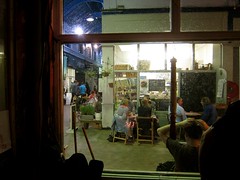 Image via Wikipedia
Image via WikipediaSuch immersive conversation gives opportunity to think about the nature of "conversation" among scholars. And how rare it really is. While long-time relationships happen among some scholars, given the discussions of this week I can be fairly confident in saying that most scholars don't have opportunity for warm, relational, and consistently constructive encounters with others in their field.
Conversation among scholars is generally a polite affair, accomplished at receptions or before or after conference sessions. Usually short, amiable, and generally quite distant. Scholars have a nice way of getting along with each other (for the most part) even if they radically disagree. But a "distant respect" is quite different from a "caring respect" that genuinely imbues the interactions among the people I was around this past week.
Not that disagreements or even outright arguments don't happen--they do. And not that this team exists as some form of romanticized utopia. That's not my view, and not my point. Instead, my observation from these past few days is that there is a different level of scholarship that occurs among active researchers who respect and trust each other.
 Image by tonyhall via Flickr
Image by tonyhall via FlickrAs scholars, so often we work alone, careful of who we tell about our ideas. Direction for many of our projects is not quite there. It can be unsettling to be so unsure of ourselves today when we can look at our cv's and have such solid evidence of quality publications from our past. Can we complete more good work? Can we get the help we need as we find our way? And will people still respect us when we admit we just might not be so clear on what we're doing?
Yet admitting uncertainty among those who respect both us as a person and the messy process of research is perhaps the most productive activity to be found in scholarship. I'm glad to have a group that allows this to happen for myself. And I hope I can be that person for others because the future of good scholarship can only be found if we avoid overconfidence and accept the feedback of others before we become only distantly caring and rigidly brilliant.





